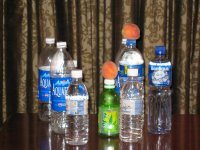Water - The elixir of life

Water is the most abundant substance in our body amounting to 60% of our body weight. It is essential for every body function and keeps the skin soft and smooth. An average adult needs about 6 to 8 glasses of water a day but may vary according to various factors.
For example, we need to drink more water in hot weathers, while exercising and even when we have a fever , cold or other illness. Nursing mothers should also increase their fluid intake to produce milk. Similarly, pregnant mothers need to drink more water to provide for the amniotic fluid. Older people als o need to drink water often as thirst decrease with age.
We also need to increase water intake when we drink tea or coffee as as drinking large amounts of these beverages produces a diuretic effect . Similarly, water intake should be increased when eating salty foods.
Interesting facts about bottled water
* 25% of bottled water is actually filtered tap water.
* Mineral water is often high in sodium.
* Plastic bottles should not be reused as constant washing and reusing accelerates the breakdown of plastic
and increases our exposure to harmful chemicals.
* Bottled water does not contain enough fluoride to protect against cavities.
* Bottled water normally contains small amounts of harmless bacteria but if stored over a long time they can
multiply rapidly and pose health hazards.

